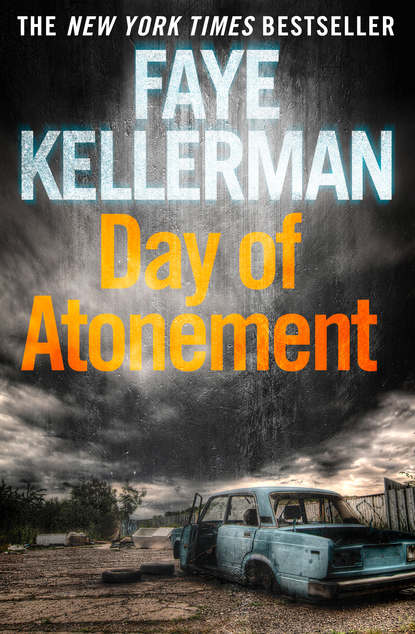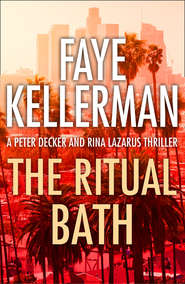По всем вопросам обращайтесь на: info@litportal.ru
(©) 2003-2025.
✖
Day of Atonement
Автор
Год написания книги
2019
Настройки чтения
Размер шрифта
Высота строк
Поля
The streets of Boro Park vibrated with an air of urgency even though most of the local businesses were closed for the day. Black-clothed men marched along the avenues, middle-aged ladies toted sacks of groceries, picking up last-minute forgotten items. Young married women wrapped in winter coats were swept along with harried grace. Some wore woolen caps, but most wore wigs—the common look being locks of straight hair that fell to their shoulders, the ends curving inward, a modified pageboy. The pink-nosed women pushed loaded-down strollers along the walkways, their progeny bundled in layers of blankets to the point of near-invisibility. Decker didn’t know if it was the unseasonable cold or what, but everyone was hauling down the streets as if fighting to make a curfew.
He stuck his hands in his overcoat pockets and told himself to slow down. He had nowhere to go, nothing to do. He tightened a tan cashmere scarf around his neck. It had been a gift from Rina—a waste of money since L.A. weather rarely necessitated scarves. But he knew she’d spent a lot of time picking it out so he wore it whenever he could. On his head was a skullcap instead of a hat. In most circles, the yarmulke would mark him as Jew. Here a mere yarmulke marked him as a “goy.”
So be it. There was only so much changing he could do and he’d be damned if he became one of them.
He thought about Rina, about how much she had eased up. She’d become calmer when they were around other Orthodox people, had stopped making excuses for his mistakes of ritual ignorance. Instead, she’d shrug them off as if they were no big deal. Infinitely better than that nervous little laugh she used to let out every time he made a faux pas.
Lord, they were different. A year ago, they were having problems and Rina had to get away from him, had to escape. Out of all the places she could have run to, she chose Boro Park.
It amazed him.
It was a small community, easy to get a feel for. The numbered streets were residential—rows of small brick houses, each one with a modicum of individual trim, but collectively they were hard to tell apart. Landscaping was kept to a minimum—small patches of brown lawn, denuded trees, not one hint of color from flowers or shrubbery. Maybe that wasn’t a fair assessment. Eastern foliage was deciduous, stripped by cold weather. He’d been judging it by L.A. standards, where the grass was green all year long. Rina had told him these homes could go for a million or more. Even with an Angeleno’s jaundiced eye, he was astounded.
He took a deep breath, his nostrils tingling from cold and the smells leaking from steamy kitchen windows. Every now and then, shouts could be heard—a mother scolding her children, a spat between husband and wife, a slamming door. The town didn’t seem to place a premium on privacy. Couldn’t possibly survive if it did, the houses built on top of one another.
New York—crowded and crowding. Everyone hemmed in. Decker longed to elbow the city in the ribs.
Give me some room, Mama.
The avenues seemed to be the business districts, storefronts gazing down narrow strips of bitten asphalt. The shops sold products that served the special needs of the community.
IZZY’S HATS; HOLIDAY SPECIAL FOR REBLOCKING. The place was nothing more than an aisle with racks of black hats.
ROCHEL’S SHAYTELS—this time the racks were full of wigs, as if some scalper had hit the mother lode.
CANNERY ROW—a store devoted to kosher dry and canned goods—all of the products certified by the Union of Orthodox Rabbis. This building was two-storied, the second floor occupied by Mendel the Scribe.
That’s what the upstairs window sign said—MENDEL THE SCRIBE: KETUBAHS AND GETS.
Wedding certificates, divorce certificates. Mendel was a man for all seasons.
Next to CANNERY ROW was GAN EDEN—the Garden of Eden. This outlet sold only fruits and vegetables. Inside was one long gondola covered with a thick plastic tarp. A handmade sign stood atop the tarp like a flag on a ship, announcing a sale on fresh horseradish root.
Little storefronts, locked tight with metal accordion grating, the display windows frosted with age. No community standards when it came to the outdoor signs—some were neon, some were lit with old-fashioned blinking bulbs, some were hand-lettered jobs. Placards were hanging on the doors of the Jewish establishments; on them were written the Hebrew words: SHANA TOVA TIKATEVU.
Happy New Year. May you be written in the book of life.
Between the shops were shtiebels—tiny, no-frills synagogues, many without pulpit rabbis. All had signs wishing people a Happy New Year.
His mind flashed to the holiday caveat: Only three things can avert the evil decree. Ten days between the New Year and the Day of Atonement—the holiest day in the Jewish calendar. Ten days to right the spiritual and physical wrongs. Sins were expunged by immersing the soul in prayer, doing proper penitence, and giving charity. He thought: Ten days allowed for a lot of breathing space.
Down the road was GLUCK’S SEPHARIM: RELIGIOUS BOOKS AND ARTICLES. Decker peered through the steel gate, inside the window. The place looked dusty. Or maybe it just appeared dusty because it was chock-full of books; the shelves seemed to be double and triple stacked, piles of tomes that reached the ceiling. Did the proprietor even know what he had in stock?
Yeah, he probably did. If he was anything like Decker’s father, he knew the store inside out. Ask Lyle Decker where anything in his hardware store was, he’d tell you.
Two-prong plug converter? Third aisle, left side …’bout two thirds of the way down, third shelf, right next to the threeway light switches.
Randy telling him, One of these days we should take inventory, Dad. Really organize the place.
You do that and I won’t be able to find a dern thing.
The air had turned biting, a bank of gunmetal clouds trying to block out the heat and light of the sun. But the mighty orb was fighting back, a burning white disk simmering in a sea of gray. The temperature was hovering in the low thirties. Decker blew hot breath onto his ungloved hands, turned up the collar on his overcoat, and moved on.
GITTEL’S BAKERY—HALAV YISROEL.
JERUSALEM GLATT KOSHER MEAT MARKET—CHICKENS FOR KAPPAROS.
The ritual of Kapparos—symbolically transferring sins to a chicken. A cock was used for a man, a hen for a woman. The chicken was swung in the air three times, special words were recited, then the bird was slaughtered and given to the poor as an act of charity. Some used money in lieu of chickens. The ritual was just custom, not law. In Decker’s mind, it seemed like a very primitive custom. Yet these old rituals had become part and parcel of the religion.
Just a hundred years ago, thousands of Jews had poured into America, working ninety hours a week for a better life, for a chance to get out of the ghetto. But for some, so much freedom had seemed too frightening.
Solution: Why not bring the ghetto into America?
And Rina chose this voluntarily.
In all fairness, Decker knew that American affluence had brought on a host of trouble. Teenage children with adult problems—alcoholism, drug addiction, abortions, divorce. Confused adults running for cover.
Some of the assimilated Jews dealt with the pressure by going inward, seeking a God higher than a BMW. They joined the cults, est, environmental groups, or the society of animal activists and spray-painted fur coats in the name of Good. A handful went back to their roots and became traditional. The “Orthodox from birth” Jews seemed to go it one step farther, deliberately shutting out the modern world altogether.
Almost none of the ultra-Orthodox families owned TVs, few read Time or Newsweek because some of the pictures featured women in “prurient” attire. U.S. News and World Report was the big periodical around these parts. Movies were out, as was popular fiction. Too explicit, though Decker was sure there was a housewife or two with a Danielle Steel novel squirreled away.
He thought: It was good that he’d met Rina. His secular ways kept her from going over the edge. He’d also make damn sure that her boys could support themselves. Many of these children didn’t bother with college—although their parents had. Instead, they opted to learn at a yeshiva, their parents or wives or in-laws supporting them.
No way he’d let the boys live on the dole.
He paused, then thought: Kids had a way of doing whatever they wanted. Just mind your own business, Deck, and let Rina worry about the boys. Besides, it was a ways off.
Decker had walked ten blocks before he realized that the neighborhood had started to change, the Jewish stalls replaced by video rental and liquor stores. He wondered whether any of the religious kids ever forayed into this neck of the woods. Did an invisible wall keep these Jews as insulated from the goyim as the Roman walls had three hundred years ago?
The Levine family flashed through his mind—the youngest son a Conservative rabbi.
And now Decker was Orthodox.
Win a few, lose a few.
He turned around and headed back to the Lazarus house, choosing to take another route, passing a kosher deli, then a little café. The café sign was written in both Hebrew and English and read: TEL AVIV—A DAIRY RESTAURANT—WE SERVE ESPRESSO AND CAPPUCCINO.
A modern reference in an ocean of Old World. He was heartened by the sight.
Decker entered the house through the front door, heard more female voices buzz-buzzing in the kitchen. The men had yet to return from the mikvah and he wondered where the boys were, wished they were around so he’d have someone to talk to.
For a moment he debated sneaking upstairs, locking the door, and reading until it was time for synagogue. But he knew that would set Rina off. Not that she minded his being by himself; she just wanted to know where he was and what he was doing.
After years of being single, he found this the hardest adjustment—having to explain your whereabouts to another person, scheduling your day with someone else in mind. Of course, he wanted to know where she was, but that was more for safety reasons.
Or so he told himself.
He slipped off his overcoat, draped it over his arm, and stood a few feet from the kitchen doorframe.











